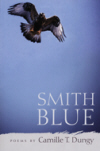Smith Blue
Selected as the winner of the open competition award for the Crab Orchard Series in Poetry, Smith Blue is a compelling collection about love and loss. The poems are prefaced by two quotes on loss, one from Gwendolyn Brooks and another from C.D. Wright, then moves into the short poem “After Opening the New York Times I Wonder How to Write a Poem about Love.” The poem details how the speaker hopes to love—“like God can love, sometimes”—and invites the reader to “Turn the page. / Turn another page,” concluding that “this was meant to be / about love. Now there is nothing left but this.” The introductory quotes and poem prepare the reader for the themes of love and loss that follow.
Selected as the winner of the open competition award for the Crab Orchard Series in Poetry, Smith Blue is a compelling collection about love and loss. The poems are prefaced by two quotes on loss, one from Gwendolyn Brooks and another from C.D. Wright, then moves into the short poem “After Opening the New York Times I Wonder How to Write a Poem about Love.” The poem details how the speaker hopes to love—“like God can love, sometimes”—and invites the reader to “Turn the page. / Turn another page,” concluding that “this was meant to be / about love. Now there is nothing left but this.” The introductory quotes and poem prepare the reader for the themes of love and loss that follow.
Dungy plays with form throughout the collection, creating an interesting and diverse book. “Her mother sings warning of the new world” is free verse with short line breaks and irregular lineation, using the white space on the page to infuse meaning into the poem. “Do not let yourself love” the “mother” in the poem declares, but also that the man she loves “will feed you well.” The poem’s strength is in the tension between the need for the man—not only emotionally but financially and physically—and the distrust of the man.
Just as the collection was begun with a single, set-apart poem, it concludes that way, with “Maybe Tuesday Will Be My Good News Day.” The music of the poem is in its repetition and alliteration—“Fireflies flaring flatted fifths” and “gone. / Gone. Gone, gone.” Like a jazz singer, the poem ends with the speaker “all tuned up and off the fence,” and “know[ing] / what comes next: One / Then one / Then two,” a phrase that not only speaks to the musical quality of this poem and other poems in the collection, but also to the focus on relationships seen throughout the book.





